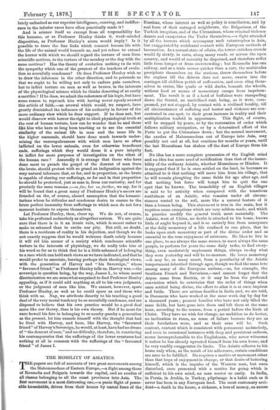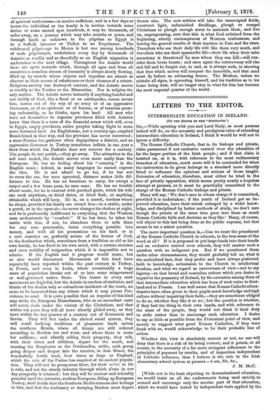THE MOBILITY OF ASIATICS.
T'papers are full of accounts of two great movements among the Mahommedans of Eastern Europe,—a flight among those of Roumelia and Bulgaria towards the capital, and an exodus of all classes belonging to all' the coast provinces into Asia. The first movement is a most distressing one,—a panic flight of peace- able hOusehblth, driven from their homes by unreal fears of the Russians, whose interest as well as policy is conciliation, and by real fears of their outraged neighbours, the Bulgarians, of the Turkish irregulars, and of the Circassians, whose criminal violence daunts and exasperates the Turks themselves,—a flight attended by all the horrors which accompany such catastrophes in Asia, but exaggerated by accidental contact with European methods of locomotion. In a normal state of affairs, the terror-stricken crowds would fly slowly, in carts, along many roads, or across the open country, and would of necessity be dispersed, and therefore suffer little from hunger or from overcrowding ; but Roumelia has one railway, and as a train moves quicker than a cart, the multitudes precipitate themselves on the stations, throw themselves before the engines till the drivers dare not move, swarm into the carriages till children perish of suffocation, and even sling them- selves in crates, like quails or wild ducks, beneath the wheels, without food or means of momentary escape from imprison- ment. The result is as if a herd of buffaloes were stampeding down the Strand, an uncivilised rush being, as it were, com- pressed, yet not stopped, by contact with a civilised locality, till all circumstances of suffering and horror and violence are con- centrated in one spot, to their great increase in reality and their multiplication tenfold in appearance. This flight, of course, will be stopped by peace, or by the restoration of order which follows military occupation, or by a determined effort of the Porte to put the Cireassians down ; but the second movement, the exodus of Mahommedans out of Europe into Asia, may possibly not end at all, but continue for months or years, until the last Mussulman has shaken off the dust of Europe from his feet.
No idea has a more complete possession of the English mind and no idea has more need of rectification than that of the immo- bility of the ordinary Asiatic, whether Mussulman or Hindoo. It is supposed that if he is once settled on the land, he becomes so attached to it that nothing will move him from his village, that he will remain ploughing the same fields for age after age, and that nothing but force will tempt him to quit the one spot that he knows. The immobility of an English villager is said to be activity when compared with the tenacious restfulness of an Asiatic, who remains under all circum- stances rooted to the soil, more like a natural feature of it than a human being. This statement is true in the main, but it requires some exceptions which are very seldom made, and which in practice modify the general truth most materially. The Asiatic, west of China, no doubt is attached to his home, knows little of aught beyond it, and is so entirely free from annoyance at the daily monotony of a life confined to one place, that he looks upon such monotony as part of the divine order and as essential to the true enjoyment of existence. He likes to live in one place, to see always the same scenes, to meet always the same people, to perform for years the same daily tasks, to find every- thing, even moderately unpleasant things, always to-day what they were yesterday and will be to-morrow, lie loves monotony —it may be, as many assert, from a peculiarity of the Asiatic temperament inherited through ages, though we find the same love among many of the European nations,—as, for example, the Southern French and Bavarians,—and cannot forget that the Aryan came from Bactria, or it may be from the profound conviction which he entertains that the order of things when once settled being divine, the effort to alter it is at once impious and futile. There are artisan families in India and, we are told, in Damascus who have worked at the same work day by day for a thousand years ; peasant families who have not only tilled the same fields, but have gone into them and left them at the same hour, according to the season, from a period before the birth of Christ. They have no wish for change, no ambition to do better, no inclination to roam, no sense of failure because they are as their forefathers were, and as their sons will be. Such content, content which is consistent with permanent melancholy, and even in occasional instances with deep and persistent sadness, seems incomprehensible to the Englishman, who never witnesses it unless he has already uprooted himself from his own home, and he very readily exaggerates its limits. The Asiatic adheres to his home only when, as the result of his adherence, certain conditions are sure to be fulfilled. Ile requires a motive or movement other than that hope of enjoyment in change, or that desire of bettering himself, which is the impulse of the Western man, but once disturbed, once presented with a motive for going which is sufficient to his own mind, no man moves so easily. In India, in Persia, in Arabia, in Turkey, pilgrimage is a habit such as it never has been in any European land. The most customary acci- dent—a death in the house, a sickness, a loss of money, an access
of spiritual restlessness—is motive sufficient, and in a few days or hours the individual or the family is in motion towards some shrine or some sacred spot hundreds, it may be thousands, of miles away, on a journey which may take months or years, and through lands as unknown to the pilgrims as Egypt is to a Suffolk labourer or Thibet to an Esquimaux. The celebrated pilgrimage to Mecca is but one among hundreds of such pilgrimages, undertaken every day by thousands of Asiatics as readily and as cheerfully as an English migration is undertaken to the next village. Throughout the Asiatic world there are spots towards which, through all ages and from all countries a ceaseless stream of humanity is always slowly flowing, filled up by crowds whose objects and impulses are almost as obscure as their means of subsistence or their chances of a return. Religious anxiety has destroyed content, and the Asiatic moves as readily as the Yankee or the Missourian. Nor is religion the only motive. The Asiatic moves instantly if anything hateful and not visibly of God, like a flood or an earthquake, comes across him, moves out of the way of an army or of an oppressive Governor, or of an epidemic or of famine, or of taxation press- ing unbearably, as he thinks, upon his land. All men who have set themselves to organise provinces filled with Asiatics know that there is a turn of the financial screw which will, even in Egypt, empty provinces, entire peoples taking flight to some more favoured land. An Englishman, not a century ago, emptied Bundelcund in that way, and the province has never recovered ; a stern Persian tax-gatherer often depopulates a district, and an oppressive Governor in Turkey sometimes inflicts in one year a blow from which his Pashalic does not recover for a century. The people do not perish,—they go away. The attraction to the soil once ended, the Asiatic moves even more easily than the European. He has no feeling about his "country," in the English sense ; indeed, in many languages he cannot express the idea. He is not afraid to go far, if he has not to cross the sea, for once uprooted, distance makes little dif- ference to him. He has no furniture to carry, for except a carpet and a few brass pans, he uses none. He has no trouble about meals, for he is content with parched grain, which his wife can cook anywhere, or dried dates, or dried flesh, or anything obtainable which will keep. He is, on a march, careless where he sleeps, provided his family are round him—in a stable, under a porch, or in the open air—he never changes his clothes at night, and he is profoundly indifferent to everything that the Western man understands by "comfort." If he has time, he takes his cattle with him, if not, he abandons them or sells them for any sum procurable, turns everything possible into money, and with all his possessions on his back or in a cart marches on, perfectly secure of the favour of God, to the destination which, sometimes from a tradition as old as his own family, he has fixed in his own mind, with a certain stoicism and even nobility of resignation which it is impossible not to admire. If the English had it progress would cease, but so also would discontent Movements of this kind have repeatedly been reported within the past century in Turkey, in Persia, and even in India, where occasionally a huge wave of population breaks out of or into some misgoverned or well-governed native State. The losses in every such movement are frightful, but the Asiatic is careless of statistics, and thinks of the deaths only as calamitous incidents of the route, no more to be lamented than any others which it may please Pro- vidence to send. It is quite possible that an impulse of this kind may strike the European Mussulmans, who as an ascendant caste will sorely chafe under the victory of the Christians, and that within ten years they will all have silently glided away, as they have within the last quarter of a century out of Roumania and Servia. They will fret under the altered social system, they will recall undying traditions of pleasanter lands across the southern Straits, where all things are still ordered according to Moslem use and wont, and where there is room for millions ; and silently selling their property, they will, with their wives and children, depart for the south, and crossing the Bosphorus or the Dardanelles, settle, each group going deeper and deeper into the interior, in Asia Minor, the wonderfully fertile land, four times as large as England, which the rule of the Pashas has emptied of its ancient popula- tion. They will not be prosperous there, for their metier in life is rule, and not the steady industry through which alone in our day prosperity is attained ; but they will be content and tolerably peaceful until the intrusive, restless European, filling up European Turkey, shall decide that the Southern Mediterranean also belongs to him, and that the stationary or decaying Moslem must depart thence also. The new settlers will take the unoccupied fields, construct light, unfurnished dwellings, plough or compel Christians to plough enough acres to maintain them, and live on, unprogressing, sure that this is what God ordained from the beginning, utterly contemptuous of Western restlessness, and leaving the general results of their inaction to Fate and the stars. Travellers who see their daily life will like them very much, and travellers who see their spasmodic life—their life when their calm monotony is threatened by men whom they can kill—will con- sider them brute beasts ; and once again the controversy will rise and fall and be fought out, to end, as it always ends, in showing that that which moves will conquer the immobile, and that sand must fly before an advancing breeze. The Moslem, unless we mistake all signs, is uprooting himself, and his tradition as to his home being Asia, will no longer stay in what for him has become the most ungenial quarter of the world.



































 Previous page
Previous page